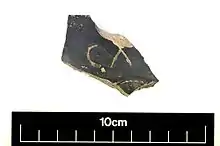Nene Valley Colour Coated Ware
Nene Valley Colour Coated Ware (or Castor Ware[1]) is a type of Romano-British ceramic produced in the lower Nene Valley (centred on Durobrivae (Water Newton)[2] from the mid-2nd to 4th centuries AD. The full name is usually abbreviated to NVCC.[3]

Industry
Pottery manufacture in the area started in the mid first century AD, with workshops associated with the Roman fort at Longthorpe[1][4] with an expansion for several miles along the Nene valley between Wansford and Peterborough in the second century.[1] The production centre was at the Roman town at Durobrivae (Water Newton)[1] although the NVCC products are associated with a number of kilns found throughout the area[5] at Stibbington,[6] Sibson-cum-Stibbington, Chesterton,[7] Yaxley,[8] and Stanground.[9]
Fabric

The NVCC ceramic is a hard, smooth-textured fabric with finely irregular fracture.[5] It is usually coloured white to off-white. The slip has a variable colour, dark brown to black, mottled lighter orange or orange-brown where thinner. The temper includes an abundant amount of very fine quartz sand and occasional larger quartz grains, red or orange and black flecks and occasional pale clay pellets.
Decoration
The decoration of NVCC vessels is quite distinctive. The most common forms are beakers; both cornice-rimmed and bag-beakers.[3] Where decoration occurs it includes barbotine (both under and over the slip), rouletting and grooving.[2] Hunt scenes in barbotine decoration are well known from the earlier part of the industry, with the use of whorls instead of these beginning in the 3rd century AD.[3]
Institutions
The following institutions are listed as having considerable collections of NVCC Ware collections:
See also
References
- Swan, V. G. 1978. Roman Pottery in Britain (Shire Archaeology). Aylesbury: Shire Publications. pp20-21
- "Nene valley Colour Coated Ware". PotSherd. 1996. Retrieved 2014-04-22.
- Monaghan, G. 1997.Roman Pottery from York (Archaeology of York Series 16/8). York: York Archaeological Trust. pp893-896
- "Longthrope Vexillation Fort". RomanBritain.org. 2010. Archived from the original on 2014-02-22. Retrieved 2014-04-22.
- "'Nene Valley Fabrics' in the National Roman Fabric Reference Collection". Museum of London. Archived from the original on 2012-11-17. Retrieved 2014-04-22.
- Historic England (2007). "Monument No. 361348". PastScape. Retrieved 2014-04-22.
- Historic England (2007). "Monument No. 364464". PastScape. Retrieved 2014-04-22.
- Historic England. "Monument No. 364521". PastScape. Retrieved 2014-04-22.
- Historic England (2007). "Monument No. 367063". PastScape. Retrieved 2014-04-22.